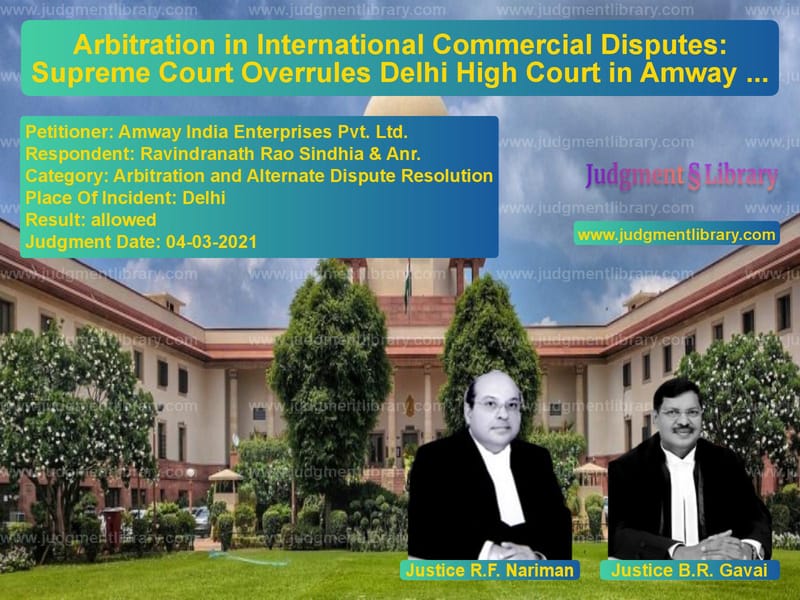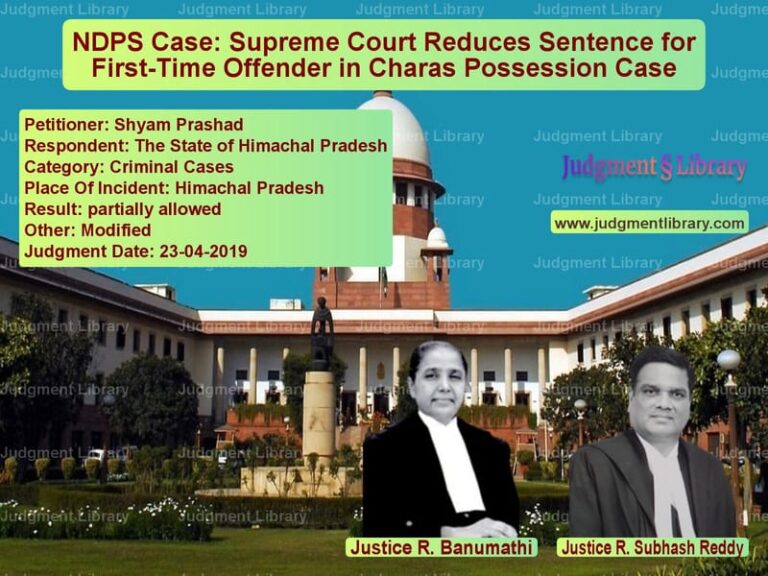Arbitration in International Commercial Disputes: Supreme Court Overrules Delhi High Court in Amway Case
The Supreme Court of India delivered a significant judgment in the case of Amway India Enterprises Pvt. Ltd. vs. Ravindranath Rao Sindhia & Anr., addressing a crucial issue regarding the jurisdiction of Indian courts in arbitration matters involving foreign nationals. The Court ruled that the dispute between Amway and its former distributors, who were U.S. nationals, falls under international commercial arbitration as per Section 2(1)(f) of the Arbitration and Conciliation Act, 1996. The judgment overruled the Delhi High Court’s appointment of an arbitrator, emphasizing that such matters must be referred directly to the Supreme Court under Section 11(6) read with Section 11(9) of the Act.
Background of the Case
The dispute arose between Amway India Enterprises Pvt. Ltd., a direct-selling company, and its former distributors, Ravindranath Rao Sindhia and Indumathi Sindhia, who were U.S. nationals but conducted business in India through a sole proprietorship named Sindhia Enterprises.
The respondents had been associated with Amway since 1998 as distributors under its multi-level marketing model. In 2019, they found their Amway Business Owner (ABO) account reclassified as a ‘Preferred Customer’ (PC) account due to non-compliance with a mandatory resale-related purchase criterion in Amway’s new Terms and Conditions introduced in 2016.
Alleging that Amway had arbitrarily terminated their ABO status without prior notice, the respondents invoked the arbitration clause in their agreement and filed a petition under Section 11(6) of the Arbitration Act before the Delhi High Court for the appointment of an arbitrator.
Arguments by the Petitioner (Amway India Enterprises Pvt. Ltd.)
- The petition before the Delhi High Court was not maintainable because the matter fell under international commercial arbitration as per Section 2(1)(f)(i) of the Arbitration Act.
- The respondents, being U.S. nationals and habitual residents of the U.S., satisfied the definition of ‘international commercial arbitration.’
- Under the Arbitration Act, only the Supreme Court, and not the High Court, had jurisdiction to appoint an arbitrator in such cases.
- The respondents had knowingly agreed to Amway’s revised Terms and Conditions and failed to meet the eligibility requirements for ABO status.
Arguments by the Respondents (Ravindranath Rao Sindhia & Indumathi Sindhia)
- They had operated their business in India as a sole proprietorship, which was centrally managed in India.
- Under Section 2(1)(f)(iii) of the Arbitration Act, their business structure constituted an ‘association or body of individuals’ with central management in India, thus falling under domestic arbitration.
- The case was not an international commercial dispute since all transactions occurred within India.
- The Delhi High Court correctly exercised its jurisdiction in appointing an arbitrator.
Supreme Court’s Observations
The Supreme Court analyzed the legal provisions and made the following key observations:
- Nature of International Commercial Arbitration: The Court held that arbitration is considered international if at least one party is a foreign national or resides outside India. Since both respondents were U.S. nationals, their case fell under Section 2(1)(f)(i) of the Act.
- Irrelevance of Business Location: The fact that Sindhia Enterprises was registered in India did not alter the respondents’ legal status as foreign nationals.
- Misinterpretation by the Delhi High Court: The Court ruled that the High Court incorrectly relied on Section 2(1)(f)(iii) concerning ‘association or body of individuals,’ which was inapplicable to a sole proprietorship.
- Binding Arbitration Clause: The respondents had explicitly agreed to Amway’s arbitration terms, which provided for binding arbitration under the Arbitration and Conciliation Act.
- Jurisdictional Mandate: As per Section 11(9), only the Supreme Court had the authority to appoint an arbitrator in international commercial disputes.
The Court stated:
“It is clear that the Delhi High Court had no jurisdiction to appoint an arbitrator in the facts of this case. Once it is established that one party to an arbitration agreement is a foreign national or habitual resident outside India, the arbitration is deemed international under Section 2(1)(f) of the Arbitration Act, and only the Supreme Court can exercise jurisdiction under Section 11(6) read with Section 11(9).”
Supreme Court’s Verdict
- The Supreme Court allowed Amway’s appeal and set aside the Delhi High Court’s judgment.
- It ruled that the appointment of an arbitrator must be sought before the Supreme Court, not the High Court.
- The respondents were directed to initiate arbitration proceedings in compliance with Section 11(6) read with Section 11(9) of the Arbitration Act.
Impact of the Judgment
- Clarity on International Commercial Arbitration: The ruling reaffirms that any arbitration involving foreign nationals falls under international arbitration, even if the business operations are conducted in India.
- Exclusive Jurisdiction of the Supreme Court: The decision establishes that only the Supreme Court has jurisdiction in such cases, preventing confusion in arbitration proceedings.
- Stronger Contractual Enforcement: The judgment reinforces the importance of contractual obligations, ensuring that arbitration agreements are upheld strictly.
- Protection for International Corporations: Businesses operating in India with foreign stakeholders can now rely on this precedent to safeguard arbitration clauses in their contracts.
Conclusion
The Supreme Court’s decision in Amway India Enterprises Pvt. Ltd. vs. Ravindranath Rao Sindhia & Anr. is a landmark ruling in Indian arbitration law. It provides clarity on the jurisdiction of courts in international arbitration and upholds the sanctity of arbitration agreements. By overturning the Delhi High Court’s ruling, the Court has reinforced that foreign nationals engaging in business within India must adhere to international arbitration norms. This judgment will serve as a guiding precedent for future disputes involving international parties in Indian arbitration.
Petitioner Name: Amway India Enterprises Pvt. Ltd..Respondent Name: Ravindranath Rao Sindhia & Anr..Judgment By: Justice R.F. Nariman, Justice B.R. Gavai.Place Of Incident: Delhi.Judgment Date: 04-03-2021.
Don’t miss out on the full details! Download the complete judgment in PDF format below and gain valuable insights instantly!
Download Judgment: amway-india-enterpri-vs-ravindranath-rao-sin-supreme-court-of-india-judgment-dated-04-03-2021.pdf
Directly Download Judgment: Directly download this Judgment
See all petitions in Arbitration Awards
See all petitions in Dispute Resolution Mechanisms
See all petitions in International Arbitration
See all petitions in Arbitration Act
See all petitions in Enforcement of Awards
See all petitions in Judgment by Rohinton Fali Nariman
See all petitions in Judgment by B R Gavai
See all petitions in allowed
See all petitions in supreme court of India judgments March 2021
See all petitions in 2021 judgments
See all posts in Arbitration and Alternate Dispute Resolution Category
See all allowed petitions in Arbitration and Alternate Dispute Resolution Category
See all Dismissed petitions in Arbitration and Alternate Dispute Resolution Category
See all partially allowed petitions in Arbitration and Alternate Dispute Resolution Category







